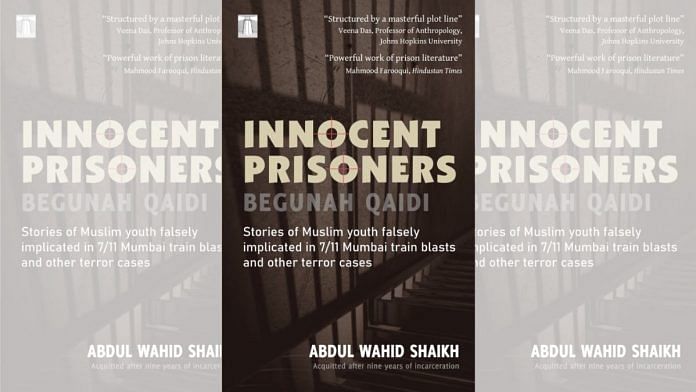New Delhi: The English translation of book ‘Begunah Qaidi’ — ‘Innocent Prisoners’ — was launched Sunday evening at the second annual conference of the Innocence Network, titled ‘India’s war of terror’.
The Innocence Network is a worldwide organisation dedicated to exonerating those wrongfully accused by providing pro bono legal services.
The book was originally written in Urdu by Abdul Wahid Sheikh, who was arrested and had been incarcerated in jail for nine years for the 7/11 Mumbai train blasts. He was acquitted in 2015. Of the 13 accused charge-sheeted by the Mumbai Anti-Terrorism Squad, Sheikh was accused no. 8 — the only one to be acquitted of all charges.
Sheikh wrote the bulk of his book while still in prison and documented his entire incarceration — the torture, forced confessions, hostility from investigative agencies and prison authorities.
“This book is not my autobiography, it is not for me to get pity… this is the story of the kind of treatment that so many face in the name of ‘terrorism’, especially those from the minority sections, Muslims in this country,” Sheikh said at the launch of the translated version.
He also appealed to everyone to help and support the other 12 still in jail and facing terror charges over the past decade.
Sunday’s event was held to mark 15 years of the 7/11 blasts. Besides Sheikh, the panel included Dr Manisha Sethi, writer, sociologist and professor; Dr Veena Das, anthropologist and professor at Johns Hopkins University, and Usha Ramanathan, legal researcher, writer, and human rights activist who has worked on poverty, labour, and civil liberties.
Also read: Are 5 on death row for Mumbai 7/11 blasts guilty? NIA/police files reveal contradictory facts
‘Definition of unlawful is vague’
Talking about ‘Anti-terror laws and the crisis of Indian democracy’, Manisha Sethi said: “The lives of people like Wahid are the living illustration of the consequences of UAPA, MCOCA and other anti-terror laws.”
Sethi criticised the Unlawful Activities (Prevention) Act (UAPA), the Terrorist and Disruptive Activities (Prevention) Act (TADA) and the Prevention of Terrorism Act (POTA).
“What makes these anti-terror laws like UAPA a problem? Is it the law as it is written or the implementation of the law that is failing? It is the very structure of the law that is a problem,” she said.
Sethi also noted that the definition of ‘unlawful’ is “vague”.
“Anything innocuous could be deemed unlawful. Books, songs, meetings of any kind could be said to be unlawful associations and that is what happens.”
Dr Veena Das, who spoke about ‘The reality of torture — Reflections on Begunah Qaidi’, said, “One of the most important points about Wahid bhai‘s book is not (that it is a) testimony but makes pedagogical points, asking what the state is, what democracy is, what torture does.”
Das noted that the book not only discusses police procedures that target individuals considered “suspects” or “accused”, but also how torture fractures entire communities.
Human Rights activist Usha Ranganathan spoke on Father Stan Swamy’s death and said it is a reminder of “institutional biases” across the country.
Ranganathan emphasised on the need for an anti-torture law in order to criminalise custodial violence in the country.
(Edited by Manasa Mohan)
Also read: In Gogoi, Kalita, Narwal and Tanha release, the UAPA still won



